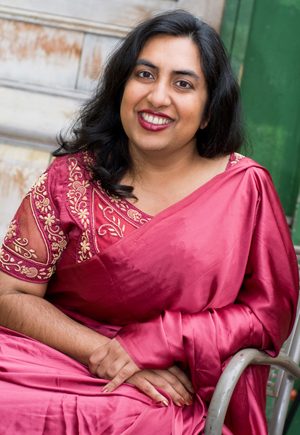A conversation with “Leaving India: My Family’s Journey from Five Villages to Five Continents” author, Minal Hajratwala.
A seven-year long project, Minal Hajratwala’s Leaving India: My Family’s Journey from Five Villages to Five Continents traces the story of her family’s migration from the Indian state of Gujarat to every corner of the globe—from the Pacific Islands to Africa to white Midwestern suburbia. The story begins with Hajratwala’s great-grandfather’s migration to Fiji in the early 1900s, and culminates with her modern day experience as a lesbian living in the San Francisco Bay Area. Like many queer women, regardless of their ethnic background or family history, Hajratwala admitted a sense of distance from her family before she began work on the book. However, she says the writing and research process changed this, “So much of who I am is based on the fact that the people before me made the decisions that they made. The fact that I can live in San Francisco, be a writer, be an out lesbian, choose to wear blue jeans or saris, cook either my mother’s daal or tofu chipotle burritos—all of those options are possible because people before me made huge, dramatic changes in their lives. They moved. And each motion has ripple effects, intended and unintended, for generations upon generations.”
Has the book been getting more attention from Indian and immigrant communities than the LGBT press?
Yeah, I think the LGBT community, I’ve been getting a really great response from, but I don’t know about LGBT press. When we did [an interview on the KQED radio show] The Forum, a lot of the callers were just calling to say, “Hey, I’m Indian and I’m gay too, and thanks for being out on the radio.” Which was surprising to me in San Francisco, but [it] made me realize, actually, the number of queer voices of color we hear publicly, in a mainstream form, is still fairly small.
You mentioned that this book might be your first “official” coming out to your family. How did they respond?
It’s been great. There might be people in my family who are having trouble with it, but if so, I’m not hearing from them. What I’m hearing is really supportive, actually … [they’re] saying really sweet things. It’s really nice to just be totally out, actually. I’m really enjoying that, and not having to go through the process of coming out to people one by one.
Were you apprehensive about the representations of your family members, and how they would react?
I definitely was apprehensive about it, and the people who were main characters had a chance to read their chapters ahead of time…so we had that conversation before the book came out. For the most part, people have been very happy with their representations. The main characters have just really been glad to have their stories told, in context.
Your family left their homeland and your parents took on atypical gender roles in their society and generation. Do you think that made it any easier for you to come out as queer?
No. I mean, that’s a connection that I have made, but I don’t think that that’s a continuum that they would see. I think that queer behavior has always been there in our communities, and that people have from time to time known it, but also that it’s not something that people have spoken about. So it’s the combination of really identifying as queer and then talking about it that is new and potentially shocking, and also potentially liberating. I do feel like there is a power in that [there] is kind of the accumulated power of a long period of silence and breaking through that. That happens for me individually as a queer person, but I think it also happens for the community as a whole somehow—that the sense of possibility can expand.
